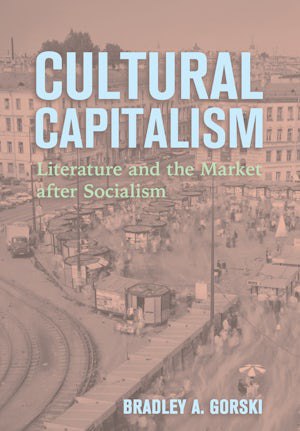tgoop.com/translit_mag/419
Last Update:
In the new book "Cultural Capitalism. Literature and the Market after Socialism" by Bradley A. Gorski the last chapter is devoted to the authors of [Translit].
"It is not despite, but precisely because of the worst developments of today’s Russia, that it is essential to study the post-Soviet decades. In order to understand how we got here, we need to pay close attention to the developments of the post-Soviet decades, not least in culture. <...> The imitator becomes the generator of new forms, new approaches. If Yeltsin’s 1996 reelection campaign, for instance, needed to borrow from Western political know-how to dig itself out of an all-but-insurmountable deficit, then by 2016, the U.S. right borrowed disinformation techniques (along with the rhetoric of oppressive liberalism) from Putin’s Russia to push an unlikely and unqualified demagogue to the U.S. presidency.
<...> An anti-capitalist alternative was not only imaginable, but became a prominent feature of Russian literature in the early twenty-first century. In this way, Russia’s cultural capitalism was rarely experienced as the “natural condition” of culture by those who found themselves within it. <...> By the mid-2000s, a new oppositional movement grew up around explicit opposition to capitalism in culture. That movement was, in many ways, recognizable as a resurrected and reformulated underground. Though significantly diminished by the onslaught of the market, neither the underground, nor the elite poetry often associated with it completely disappeared in the post-Soviet era. <...> The underground’s primary form—poetry—helped keep the market at bay. Rarely saleable, and therefore less susceptible to the market’s promises, poetry found itself pushed aside more often than overtaken by cultural capitalism.
In the first years of the new millennium a number of post-Soviet writers and thinkers who all traced their roots to the late-Soviet underground fomented the beginnings of a new resistance to cultural capitalism. In the poetics and performance of figures such as Kirill Medvedev and Keti Chukhrov, in periodicals such as Chto delat’? and [Translit], the renewed underground began to reformulate itself as an anti-capitalist aesthetic resistance.
It was also tied to politics in a way that was clearly visible and forcefully articulated. <...> Most alarming, for Skidan and Medvedev, was how this homogenized culture of neoliberal capitalism suppressed dissent, supported the status quo, and ultimately served Russia’s rising power vertical. Both used the term “fascisoid” (“fashizoidnyi”) to describe contemporary aesthetics, discerning a dangerous, reactionary tendency in Russian culture that many preferred to ignore, at least until February 2022, and that most of us still prefer to ignore in our own cultures.
But beyond that, the recent history of socialism, within the living memories of even the youngest members of these groups, meant that in post-Soviet Russia, it was quite a bit easier to imagine the end of capitalism than the end of the world. Postsocialist subjects of the 2000s were not yet of the neoliberal order but were no longer socialist. The instability of this inbetweenness could be both wrenching and generative."
Cultural Capitalism Literature and the Market after Socialism by Bradley A. Gorski is purchasable at Cornell UP and the quoted chapter is just accessible via Anti capitalism and Fight for Art.pdf
BY [Транслит]

Share with your friend now:
tgoop.com/translit_mag/419
